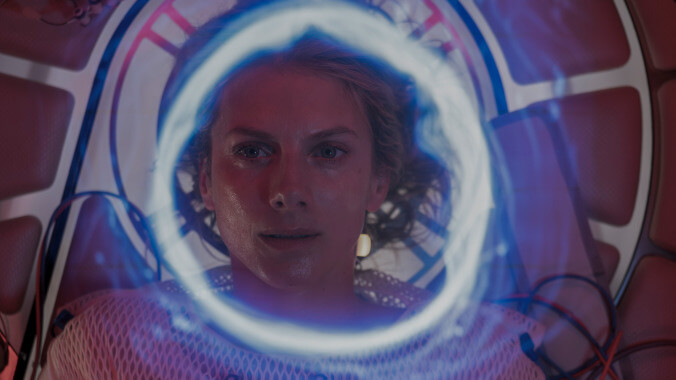The claustrophobic Netflix thriller Oxygen will take your breath away


Productions don’t get much leaner than Oxygen, which is set in a single, coffin-sized location and has a cast list of three. Starring Mélanie Laurent as a woman who wakes up in a cryogenic pod with rapidly declining oxygen levels and absolutely no idea who or where she is, this Netflix thriller is so ruthlessly efficient that it’s no surprise to see Alexandre Aja’s name in the credits. Aja’s last film, 2019’s Crawl, was set in a basement full of alligators. And while Oxygen is literally too small to accommodate any bloodthirsty reptiles, Aja, working in French for the first time in nearly 20 years, keeps the jolts coming nonetheless. He even manages to pull off a jump scare within the film’s claustrophobic confines. How, we are not at liberty to say.
Normally, we wouldn’t be quite so precious, but Oxygen is one of those films where knowing too much about it will indeed ruin the surprise. Suffice it to say that the “bioform” slowly remembering that her name is Dr. Elizabeth Hansen (Laurent) spends the film trapped with a supercomputer named M.I.L.O. (Mathieu Amalric) that has the dry wit of its obvious predecessor, 2001: A Space Odyssey’s HAL-9000. (Whenever Hansen gets agitated about her ticking-clock dilemma, the computer calmly offers her a sedative.) That’s not the only familiar thing about Oxygen: There are early shades of the Alien series and later shades of the Matrix trilogy. Meanwhile, the fractured memories that appear unbidden in Hansen’s consciousness are of your typical “dappled sunshine filtering through blurry trees” and “closeup on a hand gently stroking a lover’s shoulder” variety.
Oxygen acquits itself in one important way. This is another of those accidentally timely films, based on a script completed in 2016 by first-time screenwriter Christie LeBlanc that just so happens to include a global pandemic as a major plot point. (It was a COVID-era production, however, shot between France’s first and second lockdowns.) Enter the third credited cast member, French-Algerian actor Malik Zidi, who appears in a series of overexposed flashback sequences that grow more coherent as Hansen frantically pieces together her life before the pod. The rest of Oxygen’s just slightly too long running time—the tagline for this 100-minute film reads, “No escape. No memory. 90 minutes to live”—is taken up with conversations between Hansen and people on the outside, some of whom are there to help her and some of whom just say they are. All the while, her oxygen supply dwindles. 30 percent. 28 percent. 17 percent. 12 percent…
As one might expect, much of the responsibility for keeping Oxygen compelling rests on Laurent, who runs through all the stages of grief, from denial to acceptance, as she thrashes against her high-tech prison. She’s supported by ingenious filmmaking—one might think there are only a handful of angles from which to film a woman lying on her back in a cryogenic capsule, but Aja and his longtime cinematographer, Maxime Alexandre, come up with an impressive array of perspectives on the film’s cramped purview. Stéphane Roche’s editing is similarly stimulating, blending together fractured bits of past and present, real and imagined, into a panic-inducing fog that’s only broken when Hansen slices open her palm to confirm she’s alive.
Aside from splicing in the occasional shot of Laurent gulping for air under red lights and a blaring soundtrack, however, Oxygen is lighter on shock value than much of Aja’s work, like the comparably twisty High Tension or his outrageously gory Piranha remake. That’s not to say that there aren’t pulpy moments: One of the film’s most nerve-wracking scenes comes when a pre-programmed protocol decides that oxygen levels in the vessel are too low to ensure survival, launching a hypodermic needle full of euthanasia solution Laurent wriggles and shimmies to avoid. But the moments when Oxygen pivots from breathless suspense into high-minded sci-fi can get a bit sleepy, an effect we’re pretty sure is not supposed to mimic the impact of oxygen deprivation on the brain. That would be a pretty savvy trick, though.